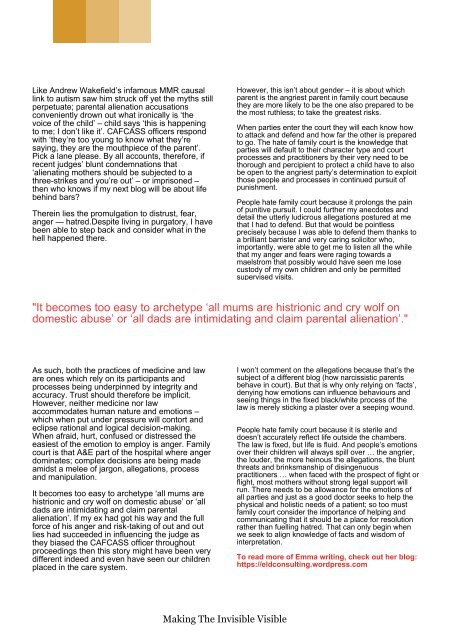You also want an ePaper? Increase the reach of your titles
YUMPU automatically turns print PDFs into web optimized ePapers that Google loves.
Like Andrew Wakefield’s infamous MMR causal<br />
link to autism saw him struck off yet the myths still<br />
perpetuate; parental alienation accusations<br />
conveniently drown out what ironically is ‘the<br />
voice of the child’ – child says ‘this is happening<br />
to me; I don’t like it’. CAFCASS officers respond<br />
with ‘they’re too young to know what they’re<br />
saying, they are the mouthpiece of the parent’.<br />
Pick a lane please. By all accounts, therefore, if<br />
recent judges’ blunt condemnations that<br />
‘alienating mothers should be subjected to a<br />
three-strikes and you’re out’ – or imprisoned –<br />
then who knows if my next blog will be about life<br />
behind bars?<br />
Therein lies the promulgation to distrust, fear,<br />
anger — hatred.Despite living in purgatory, I have<br />
been able to step back and consider what in the<br />
hell happened there.<br />
However, this isn’t about gender – it is about which<br />
parent is the angriest parent in family court because<br />
they are more likely to be the one also prepared to be<br />
the most ruthless; to take the greatest risks.<br />
When parties enter the court they will each know how<br />
to attack and defend and how far the other is prepared<br />
to go. The hate of family court is the knowledge that<br />
parties will default to their character type and court<br />
processes and practitioners by their very need to be<br />
thorough and percipient to protect a child have to also<br />
be open to the angriest party’s determination to exploit<br />
those people and processes in continued pursuit of<br />
punishment.<br />
People hate family court because it prolongs the pain<br />
of punitive pursuit. I could further my anecdotes and<br />
detail the utterly ludicrous allegations postured at me<br />
that I had to defend. But that would be pointless<br />
precisely because I was able to defend them thanks to<br />
a brilliant barrister and very caring solicitor who,<br />
importantly, were able to get me to listen all the while<br />
that my anger and fears were raging towards a<br />
maelstrom that possibly would have seen me lose<br />
custody of my own children and only be permitted<br />
supervised visits.<br />
"It becomes too easy to archetype ‘all mums are histrionic and cry wolf on<br />
domestic abuse’ or ‘all dads are intimidating and claim parental alienation’."<br />
As such, both the practices of medicine and law<br />
are ones which rely on its participants and<br />
processes being underpinned by integrity and<br />
accuracy. Trust should therefore be implicit.<br />
However, neither medicine nor law<br />
accommodates human nature and emotions –<br />
which when put under pressure will contort and<br />
eclipse rational and logical decision-making.<br />
When afraid, hurt, confused or distressed the<br />
easiest of the emotion to employ is anger. Family<br />
court is that A&E part of the hospital where anger<br />
dominates; complex decisions are being made<br />
amidst a melee of jargon, allegations, process<br />
and manipulation.<br />
It becomes too easy to archetype ‘all mums are<br />
histrionic and cry wolf on domestic abuse’ or ‘all<br />
dads are intimidating and claim parental<br />
alienation’. If my ex had got his way and the full<br />
force of his anger and risk-taking of out and out<br />
lies had succeeded in influencing the judge as<br />
they biased the CAFCASS officer throughout<br />
proceedings then this story might have been very<br />
different indeed and even have seen our children<br />
placed in the care system.<br />
I won’t comment on the allegations because that’s the<br />
subject of a different blog (how narcissistic parents<br />
behave in court). But that is why only relying on ‘facts’,<br />
denying how emotions can influence behaviours and<br />
seeing things in the fixed black/white process of the<br />
law is merely sticking a plaster over a seeping wound.<br />
People hate family court because it is sterile and<br />
doesn’t accurately reflect life outside the chambers.<br />
The law is fixed, but life is fluid. And people’s emotions<br />
over their children will always spill over … the angrier,<br />
the louder, the more heinous the allegations, the blunt<br />
threats and brinksmanship of disingenuous<br />
practitioners … when faced with the prospect of fight or<br />
flight, most mothers without strong legal support will<br />
run. There needs to be allowance for the emotions of<br />
all parties and just as a good doctor seeks to help the<br />
physical and holistic needs of a patient; so too must<br />
family court consider the importance of helping and<br />
communicating that it should be a place for resolution<br />
rather than fuelling hatred. That can only begin when<br />
we seek to align knowledge of facts and wisdom of<br />
interpretation.<br />
To read more of Emma writing, check out her blog:<br />
https://eldconsulting.wordpress.com<br />
Making The Invisible Visible


















